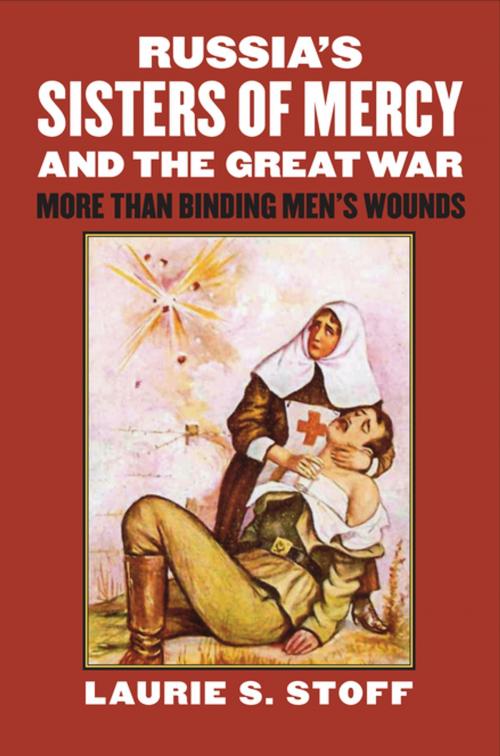Russia’s Sisters of Mercy and the Great War
More Than Binding Men’s Wounds
Nonfiction, History, Military, World War I, Health & Well Being, Medical, Nursing| Author: | Laurie S. Stoff | ISBN: | 9780700621651 |
| Publisher: | University Press of Kansas | Publication: | December 16, 2015 |
| Imprint: | University Press of Kansas | Language: | English |
| Author: | Laurie S. Stoff |
| ISBN: | 9780700621651 |
| Publisher: | University Press of Kansas |
| Publication: | December 16, 2015 |
| Imprint: | University Press of Kansas |
| Language: | English |
They are war stories, filled with danger and deprivation, excitement and opportunity, sorrow and trauma, scandal and controversy—and because they are the war stories of nurses, they remain largely untold. Laurie Stoff's pioneering work brings the wartime experiences of Russia's "Sisters of Mercy" out of the shadows to show how these nurses of the Great War, far from merely binding wounds, provided vital services that put them squarely in traditionally "masculine" territory, both literally and figuratively.
While Russian nursing shared many features of women's medical service in other nations, it was in some ways profoundly different. Like soldiers and doctors, the nurses, especially those at the frontlines, experienced extreme cold, constant fatigue, infectious diseases, deadly artillery fire, and aerial bombardment. They also assumed public leadership roles and were often in command of men. The nurses operated in a sphere traditionally considered exclusively masculine and challenged social conventions surrounding gender and war by engaging in activities considered inappropriate for women.
Filled with compelling eyewitness accounts of women who stepped outside their assigned roles in Russian society, this book gives us our first clear view of what wartime service was like for these nurses in the Great War. We learn firsthand—from memoirs and diaries, contemporary periodicals and reminiscences—about these women's motivations, the nature and specifics of their work, the cultural stereotypes and conventions that shaped their experiences, and their interactions with the men they cared for and served with. Stoff also explores the cultural and social implications of the Sisters' service—in relation to the government, the military, and the church—both immediate and long-term. The first up-close and in-depth study of Russia's nurses in the Great War, Stoff's work restores a critical chapter to the historical narrative of the war, and to the larger history of gender and culture in early twentieth-century Russia.
They are war stories, filled with danger and deprivation, excitement and opportunity, sorrow and trauma, scandal and controversy—and because they are the war stories of nurses, they remain largely untold. Laurie Stoff's pioneering work brings the wartime experiences of Russia's "Sisters of Mercy" out of the shadows to show how these nurses of the Great War, far from merely binding wounds, provided vital services that put them squarely in traditionally "masculine" territory, both literally and figuratively.
While Russian nursing shared many features of women's medical service in other nations, it was in some ways profoundly different. Like soldiers and doctors, the nurses, especially those at the frontlines, experienced extreme cold, constant fatigue, infectious diseases, deadly artillery fire, and aerial bombardment. They also assumed public leadership roles and were often in command of men. The nurses operated in a sphere traditionally considered exclusively masculine and challenged social conventions surrounding gender and war by engaging in activities considered inappropriate for women.
Filled with compelling eyewitness accounts of women who stepped outside their assigned roles in Russian society, this book gives us our first clear view of what wartime service was like for these nurses in the Great War. We learn firsthand—from memoirs and diaries, contemporary periodicals and reminiscences—about these women's motivations, the nature and specifics of their work, the cultural stereotypes and conventions that shaped their experiences, and their interactions with the men they cared for and served with. Stoff also explores the cultural and social implications of the Sisters' service—in relation to the government, the military, and the church—both immediate and long-term. The first up-close and in-depth study of Russia's nurses in the Great War, Stoff's work restores a critical chapter to the historical narrative of the war, and to the larger history of gender and culture in early twentieth-century Russia.















